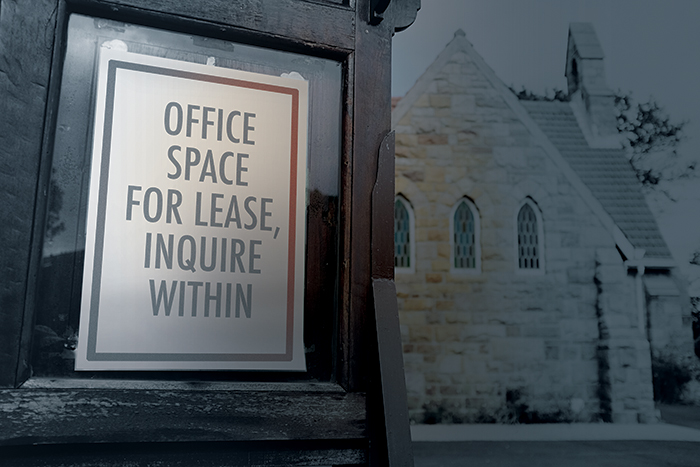Balancing the Business of Church

Is there a way for our church to be more creative and effective in reaching the community? Is there a way we can supplement our church’s income in the process? Questions like these motivate many churches to depart from traditional church models and to experiment with innovative techniques for ministry. While this kind of creative entrepreneurial spirit is commendable, it must also be balanced with an understanding of potential pitfalls that can occur when a church ventures into the marketplace.
Tax Issues
Churches are generally exempt from taxation, but that exemption is primarily limited to the income received through freewill offerings. When a church receives income through the sale of goods or services, or when it receives rental income, that income is not necessarily free from taxation. Each situation is unique and requires careful analysis so the church does not find itself inadvertently jeopardizing its mission.
One of the best ways to determine if there is a potential problem is to look at the activity from the perspective of an outsider and ask, “Does this look like the church could be in competition with a for-profit business?”
Recently, a church established a coffee shop as a focused way to reach the unchurched in an urban area. The stated purposes of the coffee shop were to proclaim the gospel and to promote prayer, Bible study, missions, Christian fellowship, evangelism, and Christian service, in order to encourage a lifetime commitment to Christ. They also sought to provide a forum for discussion of the gospel outside of a formal church setting.
They used 100% of their profits for non-profit purposes. The shop was open during regular business hours, offered free Wi-Fi to its customers, and made its facilities available for Bible studies and community events, including business meetings. It was also active in reaching out to the homeless and others in need. Paid staff and volunteers operated the coffee shop.
The IRS determined that income received by the coffee shop was not tax exempt. In a letter to the coffee shop, the IRS determined: “Your coffee shop activities are indistinguishable from similar activities of an ordinary commercial enterprise" (IRS Private Letter Ruling 201645017 (2017)).
Real Estate
Churches are generally exempt from real estate tax, but that assumes the activities on church property are exclusively for the church’s religious purposes. A church with an unused parsonage may choose to rent it out as an additional source of income. In many cases, if the property is occupied by anyone other than a ministerial employee of the church, the property must be declared as no longer being used for exempt purposes, and it will be subject to real estate tax.
If the church building or a portion of it is used during the week for purposes other than traditional church activities, the church could lose all or part of its real estate tax exemption, depending on the jurisdiction. For this reason, it is critical that church leadership consult with legal counsel and with the local tax assessment authorities before renting out or allowing the use of church facilities for any purpose.
Other Innovative Ministries
Other creative ways to increase the church’s reach into the community may include the development of schools, daycares, community centers, thrift shops, and food pantries. Each presents its own issues that will require careful attention and professional counsel to address important details. Some of the questions a professional should answer include:
- What needs to happen to maintain sufficient separation between the church and the corporation so the church is not at risk?
- Do legal, professional, or insurance requirements dictate a particular business practice that is not common to church administration?
- Do certain elements—such as intentional biblical instruction or Christian counseling—need to be incorporated into the activities in order to qualify for tax exemption?
- Could this activity jeopardize the nonprofit status of the entire church?
- Should the church obtain additional insurance coverage for the proposed activity?
Factors such as these should be identified in advance with professional counsel.
A church should also be on guard against building a specialized outreach around one person.
For example, counseling centers can be an effective extension of a church’s ministry, but what happens when the person with counseling credentials leaves the church?
Does the church want to accept the ongoing responsibility of maintaining the counseling center? What arrangements have been made concerning the center’s confidential patient records? Considering how frequently churches change pastors, office staff, and board composition, church leaders should not be too quick to legally obligate their successors to maintain a complex ministry.
A Final Consideration: Staying on Mission
A final consideration—and perhaps the most important—is whether a particular initiative has the potential of taking the church off its mission. Too many churches find themselves investing vital resources such as money, volunteers, and time to support activities that ultimately do not result in making Christlike disciples. The initiative may bring in money, and it may be doing some good, but if it takes the church’s time and attention away from its mission, it is counterproductive and should be reconsidered.
Michael Thompson is an attorney and an ordained minister who serves as general counsel for the Church of the Nazarene. For specific questions regarding matters such as those addressed in the article, feel free to email Michael at mthompson@nazarene.org.
Holiness Today, May/June 2018.
Please note: This article was originally published in 2018. All facts, figures, and titles were accurate to the best of our knowledge at that time but may have since changed.




